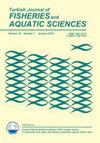Potential of Gastropods as Bioassessment of Anthropogenic Litter Pollution in Urban Lake
IF 1.7
4区 农林科学
Q3 FISHERIES
引用次数: 0
Abstract
This study on Anthropogenic Litter (AL) was conducted at 5 stations in Situ Gintung, South Tangerang, Indonesia, during the dry and rainy seasons between May to July 2015 and February to April 2016, respectively. The objectives were to determine the correlation between temporally and spatially distributed AL items with gastropods and bioassessment of lake from AL. Generally, the AL consisted of plastic products, rubber, cans, paper, and glass, where plastic bags were discovered more during the two seasons at insignificantly different quantities (p>0.05) and all stations at significantly different amounts (p<0.05). The total number and percentage AL cover with gastropods had a low linear regression value and increased by more than 80% during the rainy season. Meanwhile, the difference in the number of AL was insignificant by season but significant based on the station. Although AL had little effect on gastropods, the number of individual organisms decreased as the number and percentage of cover increased and vice versa. The results suggest that variation of presence of gastropods can be used as a bioassessment inorganic pollution of lake ecosystems.腹足类生物评价城市湖泊人为垃圾污染的潜力
这项关于人为垃圾(AL)的研究分别在2015年5月至7月和2016年2月至4月的旱季和雨季在印度尼西亚南丹格朗的司徒金东的5个站点进行。目的是确定时间和空间分布的AL物品与腹足类之间的相关性,以及AL对湖泊的生物评估。通常,AL由塑料制品、橡胶、罐头、纸张和玻璃组成,其中塑料袋在两个季节以不显著的不同数量(p>0.05)和所有站点以显著不同的数量(p<0.05)发现得更多。腹足类的总数量和百分比AL覆盖率具有较低的线性回归值,在雨季增加了80%以上。同时,AL数量的差异在不同季节并不显著,但在不同电台的情况下是显著的。尽管AL对腹足类动物的影响很小,但个体生物的数量随着覆盖数量和百分比的增加而减少,反之亦然。结果表明,腹足类存在的变化可以作为湖泊生态系统无机污染的生物评价。
本文章由计算机程序翻译,如有差异,请以英文原文为准。
求助全文
约1分钟内获得全文
求助全文
来源期刊

Turkish Journal of Fisheries and Aquatic Sciences
FISHERIES-MARINE & FRESHWATER BIOLOGY
CiteScore
3.10
自引率
0.00%
发文量
43
审稿时长
3 months
期刊介绍:
Turkish Journal of Fisheries and Aquatic Sciences" (TrJFAS) is a refereed academic journal has been published by Central Fisheries Research Institute of Turkey and Japan International Cooperation Agency (JICA), and published in English.
It aims to address research and needs of all working and studying within the many varied areas of fisheries and aquatic sciences.
The Journal publishes English language original research papers, critical review articles, short communications and technical notes on applied or scientific research relevant to freshwater, brackish and marine environments.
TrJFAS was published biannually (April & November) between 2001 and 2009. A great number of manuscripts have been submitted to the journal for review from acceptance of the SCI index. Thereby, the journal has been published quarterly (March, June, September and December) from 2010 to 2017. The journal will be published monthly in 2018.
 求助内容:
求助内容: 应助结果提醒方式:
应助结果提醒方式:


